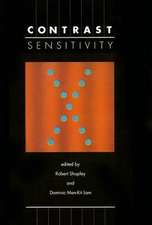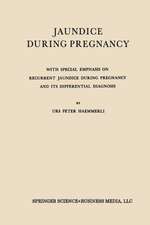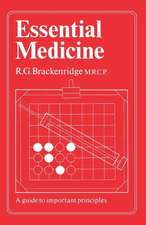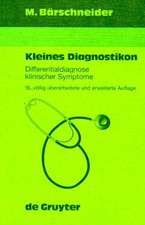Dying to be Ill: True Stories of Medical Deception
Autor Marc D. Feldman, Gregory P. Yatesen Limba Engleză Hardback – 2 mai 2018
| Toate formatele și edițiile | Preț | Express |
|---|---|---|
| Paperback (1) | 245.06 lei 3-5 săpt. | +19.07 lei 7-13 zile |
| Taylor & Francis – 14 mai 2018 | 245.06 lei 3-5 săpt. | +19.07 lei 7-13 zile |
| Hardback (1) | 1095.75 lei 6-8 săpt. | |
| Taylor & Francis – 2 mai 2018 | 1095.75 lei 6-8 săpt. |
Preț: 1095.75 lei
Preț vechi: 1153.41 lei
-5% Nou
Puncte Express: 1644
Preț estimativ în valută:
209.68€ • 216.64$ • 174.43£
209.68€ • 216.64$ • 174.43£
Carte tipărită la comandă
Livrare economică 19 martie-02 aprilie
Preluare comenzi: 021 569.72.76
Specificații
ISBN-13: 9781138063815
ISBN-10: 1138063819
Pagini: 298
Ilustrații: 10
Dimensiuni: 152 x 229 x 18 mm
Greutate: 0.45 kg
Ediția:1
Editura: Taylor & Francis
Colecția Routledge
Locul publicării:Oxford, United Kingdom
ISBN-10: 1138063819
Pagini: 298
Ilustrații: 10
Dimensiuni: 152 x 229 x 18 mm
Greutate: 0.45 kg
Ediția:1
Editura: Taylor & Francis
Colecția Routledge
Locul publicării:Oxford, United Kingdom
Public țintă
General, Professional, and Professional Practice & DevelopmentCuprins
Introduction 1. Illness and Illusion: An Overview of Medical Deception 2. Medical Abuse: When Deception is Maltreatment 3. Mental Masquerades 4. People Who Care: The Casualties of Deception 5. Drawing Back the Curtains on Motivation 6. Healing 7. Conscience, Ethics, and the Law 8. Cyber-Deception and Munchausen by Internet 9. Jumping to Conclusions: False Accusations 10. Munchausen by Animal Proxy Index
Notă biografică
Marc D. Feldman, MD, is an international expert in medical deception. His work has been featured in more than 200 magazines and newspapers, and on television and radio shows worldwide.
Gregory P. Yates, MA, is a prize-winning graduate of Oxford University and holds a Master’s degree from the University of Birmingham (UK). He is currently studying medicine in the UK.
Gregory P. Yates, MA, is a prize-winning graduate of Oxford University and holds a Master’s degree from the University of Birmingham (UK). He is currently studying medicine in the UK.
Recenzii
"Feldman and Yates have written a dramatically wonderful book. In some ways the book is "written" by the real-life accounts of the individuals who contributed their stories, but the scientific knowledge that accompanies the stories is fantastic. People who fake illness anger and disappoint family, friends, and physicians. Empathy and compassion for these people does not come easily; however, reading this book will not only open your eyes regarding the illness from which the people suffer, it will enable you to offer them the emotional support they deserve."
Philip R. Muskin, MD, MA, DLFAPA, FACLP; Professor of Psychiatry at Columbia University Medical Center, New York
"This fascinating book pulls the veil back on one of the least understood conditions in psychiatry. Typically misunderstood, resented, and even reviled by the health care professionals, family members, and others who have been manipulated by their deceptive behaviors, these in-depth case studies go a long way towards helping to promote understanding and empathy for the extreme psychological suffering that is the at the root of this condition."
Michael First, M.D., Professor of Clinical Psychiatry, Columbia University
"As junior clinicians we are taught to listen to and believe what patients tell us. But what do we do when the patient’s account is not consistent with test results or third party descriptions? In this fascinating book, which includes chapters on fabricated and induced illness in children, cyber-deception and Munchausen by animal proxy, Feldman and Yates use extensive first person accounts to highlight the rich clinical material. In doing so they encourage us to think beyond conventional therapeutic relationships and to confront the ethical and professional dilemmas posed. In considering what motivates people to fabricate or deceive they introduce us to potential ways of trying to understand and manage these complex needs."
Christopher Bass MA MD FRCPsych; Consultant in Liaison Psychiatry, John Radcliffe Hospital
"'How could a mother do that to her child?' 'Why would people deliberately make themselves ill?' This book provides insight into these questions through first-hand narratives that are accompanied by the informed and thoughtful analyses of Dr. Feldman and Mr. Yates. Dying to Be Ill is a must both for professionals and anyone else attempting to understand the perplexing world of medical deception."
Mary J. Sanders, Ph.D.; Clinical Associate Professor, Stanford University Medical School
"Dr. Marc Feldman is a widely acclaimed expert on factitious disorder – a condition that is often missed in clinical practice, causes tremendous suffering, and is very challenging to treat. This new contribution from Dr. Feldman is a fascinating and very valuable contribution that sheds important light on this often-misunderstood mental health condition."
Katharine A. Phillips, MD; Professor of Psychiatry, Weill Cornell Medical College & Warren Alpert Medical School of Brown University
"In Dying to Be Ill, Marc Feldman and Gregory Yates examine illness deception with utmost clarity. It is rich in clinical material that illustrates the complicated features of illness deception. They elucidate the factors associated with the disorder, its multivariate forms, and the impact it has on others. They then proceed to clarify various treatment approaches for this challenging condition. This book represents an impressive state of the art overview from Dr. Feldman who has established himself as one of the world's foremost experts on illness deception."
Stuart Eisendrath, MD
"Dying to be Ill makes a significant contribution to the literature by documenting the lived experience of people who suffer with a disorder that has been neglected by the healthcare and psychiatric communities. The narratives and first-hand accounts elicit compassion for, and remorse from, those willing to tell their story. It is time for the treatment of factitious disorders to move more toward the addiction, or disease model, while reducing stigma and shame that often deters those afflicted from getting much needed treatment."
Beatrice Crofts Yorker, JD, RN, MS, FAAN; Professor Emerita of Nursing and Criminal Justice and Retired Dean of Health and Human Services California State University, Los Angeles
"The book manages to straddle the divide between the lay public and medical professionals with notable ease. Concepts that will be familiar to us in psychiatry are introduced and defined but the progression into substantive discussion and novel information is rapid enough that even seasoned consultationliaison psychiatrists would not find their interest flagging."
Jason P. Caplan, MD, Deputy Editor of Psychosomatics
This is an extremely well written proposal that lays the groundwork for a classic book on factitious disorders. It is well organized and very comprehensive in describing the field from phenomenology to etiology and treatment. It is one of the most well organized proposals I’ve read. Yes there is a need for this book. This area is a clinical challenge and a current book as proposed is likely to become the gold standard in the field. Factitious disorders is one of the most challenging areas of mental health and this book will shed considerable light on its nuances. Prof Stuart Eisendrath, UCSF Medical Ctr.
Philip R. Muskin, MD, MA, DLFAPA, FACLP; Professor of Psychiatry at Columbia University Medical Center, New York
"This fascinating book pulls the veil back on one of the least understood conditions in psychiatry. Typically misunderstood, resented, and even reviled by the health care professionals, family members, and others who have been manipulated by their deceptive behaviors, these in-depth case studies go a long way towards helping to promote understanding and empathy for the extreme psychological suffering that is the at the root of this condition."
Michael First, M.D., Professor of Clinical Psychiatry, Columbia University
"As junior clinicians we are taught to listen to and believe what patients tell us. But what do we do when the patient’s account is not consistent with test results or third party descriptions? In this fascinating book, which includes chapters on fabricated and induced illness in children, cyber-deception and Munchausen by animal proxy, Feldman and Yates use extensive first person accounts to highlight the rich clinical material. In doing so they encourage us to think beyond conventional therapeutic relationships and to confront the ethical and professional dilemmas posed. In considering what motivates people to fabricate or deceive they introduce us to potential ways of trying to understand and manage these complex needs."
Christopher Bass MA MD FRCPsych; Consultant in Liaison Psychiatry, John Radcliffe Hospital
"'How could a mother do that to her child?' 'Why would people deliberately make themselves ill?' This book provides insight into these questions through first-hand narratives that are accompanied by the informed and thoughtful analyses of Dr. Feldman and Mr. Yates. Dying to Be Ill is a must both for professionals and anyone else attempting to understand the perplexing world of medical deception."
Mary J. Sanders, Ph.D.; Clinical Associate Professor, Stanford University Medical School
"Dr. Marc Feldman is a widely acclaimed expert on factitious disorder – a condition that is often missed in clinical practice, causes tremendous suffering, and is very challenging to treat. This new contribution from Dr. Feldman is a fascinating and very valuable contribution that sheds important light on this often-misunderstood mental health condition."
Katharine A. Phillips, MD; Professor of Psychiatry, Weill Cornell Medical College & Warren Alpert Medical School of Brown University
"In Dying to Be Ill, Marc Feldman and Gregory Yates examine illness deception with utmost clarity. It is rich in clinical material that illustrates the complicated features of illness deception. They elucidate the factors associated with the disorder, its multivariate forms, and the impact it has on others. They then proceed to clarify various treatment approaches for this challenging condition. This book represents an impressive state of the art overview from Dr. Feldman who has established himself as one of the world's foremost experts on illness deception."
Stuart Eisendrath, MD
"Dying to be Ill makes a significant contribution to the literature by documenting the lived experience of people who suffer with a disorder that has been neglected by the healthcare and psychiatric communities. The narratives and first-hand accounts elicit compassion for, and remorse from, those willing to tell their story. It is time for the treatment of factitious disorders to move more toward the addiction, or disease model, while reducing stigma and shame that often deters those afflicted from getting much needed treatment."
Beatrice Crofts Yorker, JD, RN, MS, FAAN; Professor Emerita of Nursing and Criminal Justice and Retired Dean of Health and Human Services California State University, Los Angeles
"The book manages to straddle the divide between the lay public and medical professionals with notable ease. Concepts that will be familiar to us in psychiatry are introduced and defined but the progression into substantive discussion and novel information is rapid enough that even seasoned consultationliaison psychiatrists would not find their interest flagging."
Jason P. Caplan, MD, Deputy Editor of Psychosomatics
This is an extremely well written proposal that lays the groundwork for a classic book on factitious disorders. It is well organized and very comprehensive in describing the field from phenomenology to etiology and treatment. It is one of the most well organized proposals I’ve read. Yes there is a need for this book. This area is a clinical challenge and a current book as proposed is likely to become the gold standard in the field. Factitious disorders is one of the most challenging areas of mental health and this book will shed considerable light on its nuances. Prof Stuart Eisendrath, UCSF Medical Ctr.
Descriere
This reference for physicians and family members of FD patients explores the range of disorders and reveals how to diagnose and treat these conditions.

















